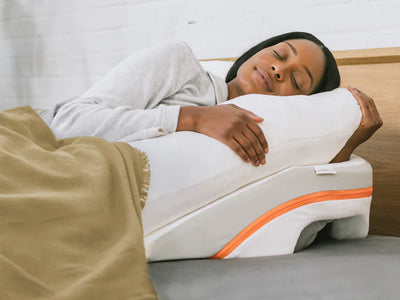
Related Product

Reflux Relief System
$249.99 USD
Say goodbye to nighttime Acid Reflux & GERD pain without sacrificing comfort.
The Impact of Screen Time Before Bed on Sleep Quality: How Electronics Affect Your Sleep
Share
Technology has made our lives easier, better, and more productive. But it’s also made us constantly connected, feeling like we can never log off entirely — even when we sleep. But how bad is it to use screens before bed? Does technology affect our sleep in significant ways? The answers might surprise you.
Read on to learn more about the impact that electronics have on sleep quality.
Reasons To Put Your Screens Away Before Bed
Using electronics too close to bedtime can greatly impact your sleep. Here are some of the ways technology and screens before bed can affect not only your sleep quality but also your overall health.
It Stimulates Your Brain
The moments before bed should be a time for our brains to wind down from the day's activities. However, bringing electronics into our bedtime routine can keep our brains active and awake, making it harder to fall asleep. This is one of the key ways electronics affect sleep.
It Limits REM Sleep
When your brain stays alert from activities like doomscrolling or thinking about a work project, it can keep you awake and make it harder to fall asleep. This distraction can affect the quality and quantity of your rapid eye movement (REM) sleep, which starts within the first 90 minutes of falling asleep, then cycles through your sleep the rest of the night.
Quality REM sleep is important because it impacts your learning, memory, and mood. Research has also shown that insufficient REM sleep can lead to health issues like reduced coping skills, migraines, and obesity.
Blue Light Can Disrupt Your Internal Clock
The blue light from your phone and other electronic devices mimics daylight. According to recent studies, this can disrupt your circadian rhythm, which is your body’s internal clock that tells you when it’s time to sleep and when it’s time to be awake.
Other research has found that artificial blue light can also reduce levels of melatonin, a hormone that controls your sleep-wake cycle. When you have less melatonin, you can feel tired and irritable during the day.
It Can Cause Strong Emotions
Using your phone or other technology before bed can garner intense emotions. Reading a disturbing news story or receiving a heated message before bed can cause you to be upset. And as studies have shown, stress and anxiety are two primary factors for poor sleep quality.
Tips for Creating a Screen-Free Zone Before Bed
It’s generally recommended to stop using your phone or other technology at least an hour or two before bed. Here are a few other tips on how to reduce screen time before bed to improve sleep quality.
- Create a check-in spot - Set up a space either outside your bedroom or away from your bed where you can “check-in” your technology for the night.
- Determine “screens off” times - Set a time to power down each day and put your screens on night mode. This is also a great way to set boundaries for not feeling like you have to be available 24/7 to friends, family, and co-workers.
- Use a simple alarm clock - Replace your phone alarm with a basic alarm clock if you need help waking up on time.
- Establish bedtime rituals - Create a nighttime routine filled with healthy sleep habits that can help your brain unwind. This could look like taking part in relaxing activities like stretching, meditation, or journaling.
- Keep a book by your bed - Swap out your phone for a good novel. Studies show that reading a book before bed can help lower cognitive arousal and “destimulate” your brain.
Using Electronics at Night
If you find yourself in a situation where you have to use your electronics at night, there are a few things you can do to minimize their effect on your sleep. Here are some strategies to mitigate the impact of screen time before bed on sleep quality.
First, put your cell phone, tablet, or other electronic device on “sleep mode.” This softer light can make it easier on your eyes and help reduce blue light emissions.
Secondly, invest in a pair of blue-light-blocking glasses to help shield your eyes from your screen’s blue light emissions.
And finally, limit your screen time at night as much as possible.
MedCline’s Sleep Solutions for Quality Sleep
Your bedding is also equally important to getting good sleep. MedCline provides a range of pillows to help you sleep comfortably on your side, with pillows helping to keep your head and spine properly aligned.
Our products have been clinically proven to relieve the symptoms of chronic health issues and sleep disorders. Our line includes:
- An acid reflux system that soothes nighttime reflux
- A shoulder pain relief system to help you find comfort while you sleep
- A therapeutic body pillow for full-body support
Sleep, feel, and live better with a MedCline Relief System and get the rest you deserve.
Screens Before Bed FAQs
Are screens before bed OK?
Research indicates that using electronic devices for more than two hours in the evening can significantly disrupt the surge of melatonin, a hormone crucial for sleep. It's recommended to switch off all electronic devices at least an hour before bedtime. Instead of screen time, consider engaging in relaxing activities like reading a book or taking a bath.
Why shouldn't you watch TV before bed?
The consensus among scientists is that exposure to screens, including TV, before bed negatively impacts sleep. The primary reason is that the blue light emitted by screens can suppress the production of melatonin — a sleep hormone — and disrupt your body's internal clock or circadian rhythm.
Is TV before bed as bad as a phone?
Generally, it's advisable to stop using all electronic devices, including phones and TVs, an hour or two before bed. While smartphones are often the main concern, tablets and TVs can also contribute to poor sleep due to their screen light and stimulating content.
How far away should your phone be when you sleep?
To minimize radio frequency exposure, it's recommended to keep your cell phone at least 3 feet away from your bed. If you don't rely on your phone's alarm clock, consider turning it off or putting it on Airplane Mode before you go to bed.
How long before bed should I stop looking at screens?
To help your body prepare for sleep, it's recommended to avoid using electronic devices for at least 30 minutes before bed.
What are 3 strategies to not use screens before bed?
Some strategies to avoid screens before bed include setting a specific time to turn off the TV and other electronic devices, creating a designated spot to "check-in" your technology for the night, and establishing new bedtime rituals and habits that don't involve screens.
What can I do at night instead of screens?
Instead of using screens, consider reading a book, engaging in relaxing activities like stretching, meditation, journaling, or listening to calming music. These activities can help your brain unwind and prepare for sleep.
How does screen time affect the brain?
Excessive screen time can overload the sensory system, fragment attention, and deplete mental reserves. This can lead to aggressive behavior and difficulty focusing, as the ability to process one's internal and external environment suffers.
What is good sleep hygiene?
Good sleep hygiene involves creating a quiet, dark, and relaxing bedroom environment at a comfortable temperature. It's recommended to remove electronic devices like TVs, computers, and smartphones from the bedroom. Avoiding large meals, caffeine, and alcohol before bedtime and getting regular exercise can also contribute to good sleep hygiene.
Resources
“Everything You Need to Know About Doomscrolling and How to Avoid It.” Cleveland Clinic, 1 Sep. 2020, https://health.clevelandclinic.org/everything-you-need-to-know-about-doomscrolling-and-how-to-avoid-it/
Peaver, John, and Patrick M. Fuller. "The Biology of REM Sleep." Current Biology, 2016, https://doi.org/10.1016/j.cub.2015.11.011.
“What is REM sleep?” Medical News Today, 25 Nov. 2021, https://www.medicalnewstoday.com/articles/247927
“Blue Light Has a Dark Side.” Harvard Health Publishing, 7, Jul. 2020, https://www.health.harvard.edu/staying-healthy/blue-light-has-a-dark-side
West, Kathleen E., et al. "Blue Light from Light-emitting Diodes Elicits a Dose-dependent Suppression of Melatonin in Humans." Journal of Applied Physiology, 2011, https://doi.org/10.1152/japplphysiol.01413.2009.
Molen, Y, et al. "Pre-sleep Worry Decrease by Adding Reading and Guided Imagery to Insomnia Treatment." Sleep Medicine, vol. 14, no. 1, 2013, pp. e210-e211, https://doi.org/10.1016/j.sleep.2013.11.504.
Related Product

Reflux Relief System
$249.99 USD
Say goodbye to nighttime Acid Reflux & GERD pain without sacrificing comfort.
